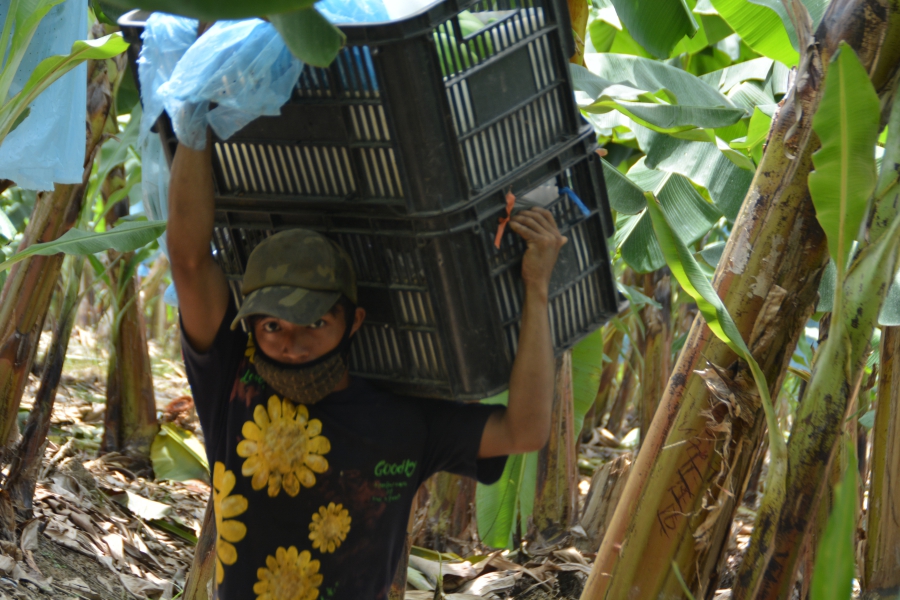ECONOMIC RIGHTS
Something plagues our banana farms

A farmer carries banana crates on his shoulder. In Compostela, a 13.5kg box of bananas can sell for as little as $3.00 (P150). The cost of inputs like pesticide and fertilizer are further deducted from this.
Four men reach up and, with precision, cut the bananas hanging from the branch. The freshly cut bananas are handed to another person for bagging. Then placed in the crates. Another man cuts the branch and falls in one swift slash, without a sound.
Their tasks complemented one another. Everything looked natural, as if acting on instinct.
Why wouldn’t they? The workers in the banana plantation in Compostela Valley, Davao are together for almost every day. No ifs, no buts, even if it rain pours too hard or if the sun strikes too hot.
But behind the seamless choreography of harvesting bananas – perfected through years of working and fatigue – is a plague that has riddled the plantation of the farmer beneficiaries of the Davao Fruits Banana Growers Agrarian Reform Cooperative (DFBGARC).
The plague causes intense poverty, wild cycles of debt, desperation, and, in worst cases, death.
Antonio Remedios Jr, 34, saw this with his own eyes. Compared to the other members of the DFBGARC, Remedios is a young farmer beneficiary. He just recently assumed the responsibility because his father passed away. If he didn’t, the land would go to someone else. The blood and sweat of his father would have been for naught.
Remedios wholeheartedly accepted the torch. After all, he grew up in a farm and worked as a farmworker.
When Remedios accepted the torch, he thought that nothing will change. And nothing has ever changed. From the years of his father, to his, the plague still remains.
The plague
The swatches of light still pass through the banana leaves. Remedios’ skin is still etched with lines and still darkened as wood. The callous in his hand still remain. Along with it are the unforgiving conditions that banana farmers and plantation workers are exposed to under the plague that are unfair contracts with SUMIFRU Philippines.
SUMIFRU Philippines is a Japanese-owned company that engages in the sourcing, production, shipment and marketing of various fresh fruits, primarily the export of quality Cavendish bananas, Pineapple and Papaya. They own several plantations in Mindanao.
Under heavy heat, the plantation workers and farmers still work hours and hours of intense manual labor to achieve their quota. The minimum wage of P335 is not livable enough, and the farmers and workers receive even less.
The three workers that Remedios hired to assist him in tending the bananas have started to request for an increase in salary. Ka Ton said that he would give it if only he could, if only the buying prices were higher.
Since 2008, a box or 13.5 kg of bananas is only bought by SUMIFRU for $3.00. After several heated discussions, the banana farmers recently secured the price of their bananas up to $4.25. The amount that they have won through rigorous discussions is already a big victory for the cooperative and the banana farmers.
Other companies, however, buy a box of bananas for $6.00. As of October 2016, the Freight on Board (FOB) price of Philippine bananas already range from $4.00 to $8.00. The Philippine Exporters Confederation – Davao even slated the price up to $10.00.
“Kapag maliit lang yung buying price ng boxes dito, di kami makakabigay ng saktong sweldo sa trabahante,” Remedios said. “Di rin namin maibigay kasi wala namang matitira samin. Anong ipapanggastos sa araw-araw? May pamilya rin kami. Yung trabahante namin, may pamilya rin.”
He explained that the meager amount that the workers and the farmers receive are subject to the impossibility of budgeting for loans, the children’s allowances, and for their daily meals. It’s not enough, he says, but it gets their family through the day.
However, the low buying prices are just one of the issues. SUMIFRU has no transparency in the prices of the inputs and the deductions on the payment. The classification of the bananas is also dubious – Class A bananas get downgraded to Class B without explanations. Even the cost of production, inputs, and shipping damages are shouldered by the farmers.
In sickness and in health
Working in a banana plantation also gnaws at one’s health.
Farmers need to take a bath at least twice a day, and if they can’t, then they must change clothes because remnants of the chemicals are still there. Aside from the chemicals, they also do the intensive physical labor even when it rains.
These farmers and workers are without health insurance and government benefits. They are only given small amounts from the farmers’ cooperative because that is only what they can afford.
“Kahit may sakit sila at hindi kumpleto yung mga kagamitan, kailangan parin nilang magtrabaho kasi wala naman silang choice,” Remedios said.
The only choice in Compostela Valley is to work in the banana plantations. You grow up in a banana farm and you will spend your life working in one – just as him.
“Kahit bago lang ako dito, dito na ako lumaki eh, wala ng iba,” Remedios said.
Despite this, Ka Ton’s hope for change never falters. He, together with 300 more banana farmers in Compostela Valley, call on for government action and prioritization of the needs of the farmers, peasants, and the rural folk.
Through several discussions, DFBGARC calls for the government to uphold its mandate and help them to revoke the unfair contracts with SUMIFRU.
6 more years of the plague – the unfair contracts – and the only way forward is to fight for change. He got to see the plague when it affected his family and how it will affect the family that he will soon build.
Unless something is done.
Recently, the DFBGARC won their demand with SUMIFRU to remove the costs of the pesticide from the deductions. This led to an increase of $.075 in the buying price of their produce.
“Ngayon, nakakaakyat kami, kahit pakonti konti, at least may nangyayari. Walang problema basta magtulungan lang kami dahil ang gusto namin ay may magbago,” Ka Ton said.
